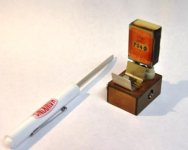Not active now but first licensed in 1955.
Got a signed framed map showing the flight of the KC-97 with Gen Curt LeMay and Butch Griswold and their venture into SSB.
Was the pioneer venture into SSB for military communications. They were really nice guys to chat with.
Talked with them on the way over to Europe, was a DL4 then, and on the way back.
Gotta get back active now that I am out of the No-Antenna HOA situation.
Got a signed framed map showing the flight of the KC-97 with Gen Curt LeMay and Butch Griswold and their venture into SSB.
Was the pioneer venture into SSB for military communications. They were really nice guys to chat with.
Talked with them on the way over to Europe, was a DL4 then, and on the way back.
Gotta get back active now that I am out of the No-Antenna HOA situation.

